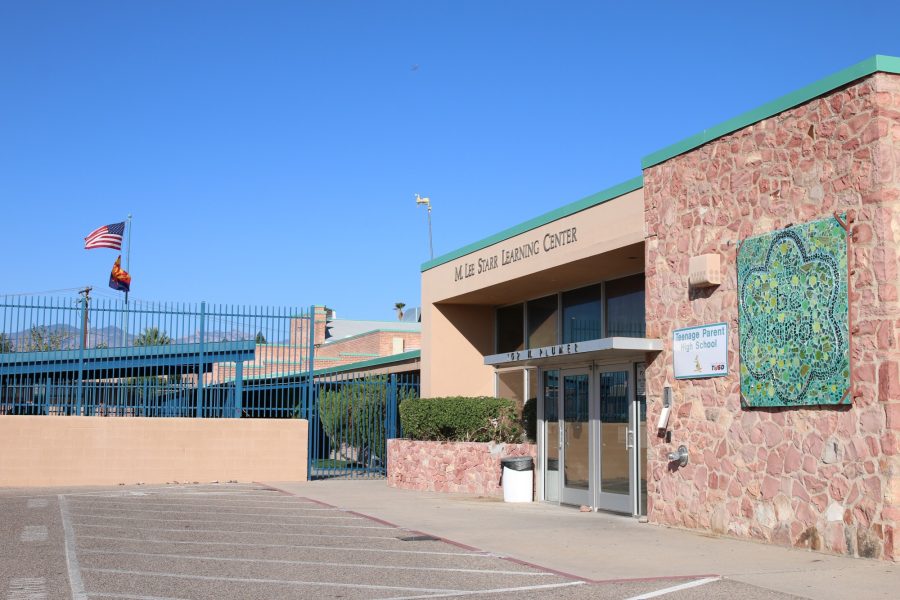Students entering through the front doors of Teenage Parent High School, walking with both a backpack and a baby in tow, can expect to hear the sound of wailing infants and young mothers trying to hush them on the other side of the door. This is just another morning for the pregnant and parenting high school students of Teenage Parent High School, or TAP, in the Tucson Unified School District.
At TAP, the school day begins when students drop their babies off at one of the four Early Childhood Learning Labs on campus, all of which are staffed by infant care specialists. The teenage parents then attend general education classes like those in all Arizona public schools in addition to electives like support groups and birthing and parenting classes.
RELATED: By teens, for teens: peer-designed sexual health clinic continues to expand
TAP school counselor Meg Siath said that typical discussion topics during lunch include both parental issues, like dilation and birthing, as well as the sorts of things a person would overhear in any school cafeteria.
“You know, they’re teenage girls,” Siath said. “They like makeup. They like the eyebrows done. They like the shoes, the newer clothing after they’ve had their baby.”
The young students at TAP learn how to cope with the typical challenges that all teenagers experience, how to parent and how to support themselves and their children with minimal financial resources.
“We say that they are kind of in a time warp with our 15-year-olds because their maternal instincts are really kicking in, and they’re going to be very responsible moms, but they’re also like, ‘I’ve got to study for my driver’s license test,’” Siath said.
According to Siath, 31 out of the 58 students at Teenage Parent High School are categorized as homeless, which means they are living somewhere without their parents.
“We have students who live with, say, 14 other people in a home and they’re pregnant or living with their grandparents, or an older sibling, or in group homes,” Siath said.
Siath previously worked at St. Augustine Catholic High School, where many of students attended on scholarship and were below the poverty line.
“I thought I worked in a school with poverty before at St. Augustine. I thought I knew what poverty looked like, but there’s no judgment. They’re just regular people,” Siath said.
TAP assists its students by providing supplies for their babies, but lack of money makes this challenging. The school’s principal, Anne Dudley, said that TAP receives some funding for its teenage students through Title I, but the school is not afforded additional financial assistance for infant care and supplies.
“Most state and federal funds for public schools are really restricted. You have to justify everything,” Dudley said. “Even with Title I, which is meant to help students who live in poverty in the school setting, we still can’t gift things to students through our Title I funds.”
TAP is permitted to utilize state and federal funding for typical classroom items such as paper and laptops, but they are not at liberty to use these funds to purchase necessities for infants like diapers, baby wipes and baby formula. For these, the school relies exclusively upon donations. The school has a “Ways to Help” section on its website.
Recently, the University of Arizona’s Greek Life partnered with TAP for a “Formula Drive” that will last through Nov. 22. Dudley expressed TAP’s need for donations of formula, diapers and maternity clothes year-round.
“The reason why we’re having the formula drive is that almost all of our students live in poverty or extreme poverty,” Dudley said. “Kids come to us because they don’t have enough money for formula, or milk or whatever it is that they need. Then they start making choices between, do they feed themselves or do they feed their baby? Can they buy diapers? Or can they buy formula?”
UA students have been involved with TAP in the past through “Mentoring for Moms.” This organization is not currently in effect, but Dudley said she hopes to reinstate it.
“The person who oversaw that [organization] was connected with the undergraduate psychology department,” Dudley said. For internships through the psychology department, UA students “would be matched with a [TAP] student, and they would be trained on how to mentor a parenting teen, and then they did a lot of self-reflection inventories, strength inventories and college inventories.”
RELATED: TUSD meeting on inclusive curriculum ends in no vote
Even though the Mentoring for Moms organization is not currently operating, several UA students are involved with TAP through Young Life,a religious organization for young people. These UA students join the teenage parents for lunch twice a week to socialize, spend time with the babies and share their college experience with the TAP students.
“It’s a beautiful relationship that I’ve seen with the college students that are here during lunch,” Saith said. “College students are asking our moms ‘what’s it like to be a mom?’ because they are college students full time and it’s just a give and take.”
Follow the Daily Wildcat on Twitter









